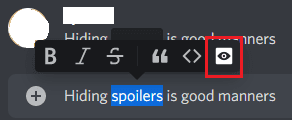

- #DISCORD MARK TEXT AS SPOILER MOVIE#
- #DISCORD MARK TEXT AS SPOILER CODE#
- #DISCORD MARK TEXT AS SPOILER TV#
#DISCORD MARK TEXT AS SPOILER MOVIE#
Though the movie is a sequel to the Compilation Movie trilogy and not the show, where Lelouch remains dead.
#DISCORD MARK TEXT AS SPOILER CODE#
The movie title, Code Geass: Lelouch of the Re surrection, gives away that Lelouch died and is going to be resurrected in the movie.It spoils that something's going to go horribly wrong, but it's still quite surprising that Princess Euphemia is the one who does the killing. "Bloodstained Euphie" is a middle example.Twenty dollars on the outcome of "Tooya Dies" in Ceres, Celestial Legend.In the last episode of the Bubblegum Crisis OVA Bubblegum Crash, until very late in the episode, the true plan of the Boomer antagonists is unknown but the Title of the Episode actually spoils a rather huge part of this plan.For example, the chapter in which it is determined whether "Detective Trap" will be canceled, (and it is canceled) is titled "18 and 40", and refers to Mashiro realizing that his hope of getting an anime by age 18 will never come true, and after sending an e-mail to Azuki about the cancelation on the last page, she jokingly replies that she wants to get married before 40. Bakuman。 manages to avert this, with its The Noun and the Noun titles, which often only become clear when the chapter is read.

Of course, "felled" doesn't always mean "killed". In the show's defense, however, that also happens in the first episode.
#DISCORD MARK TEXT AS SPOILER TV#
Note that this can apply to episode titles that are never displayed on-screen during the episode, as it can be difficult to avoid seeing them in TV guides and on DVD packaging. Chapter titles in the " In Which a Trope Is Described" style often can end up as these. Some works hide the spoiler by closing on title (or not displaying it at all) instead of opening with it. If it spoils the existence of something, rather than a plot point, then it's The Namesake. If the title says everything important about what happens and how, then it is also Exactly What It Says on the Tin, but just revealing that someone dies or is introduced usually isn't enough. Many examples of an Excited Title! Two-Part Episode Name! may also be this. If the title is shown on the DVD cover for Season 2 and it's a casual giveaway of the shocking twist at the end of Season 1, you're looking at a Late-Arrival Spoiler. If the title is shown in the opening of the episode, may be a Spoiler Opening. If the creator is NOT lying or teasing, it's this trope. Would the title answer it? Oh, and X Dies builds up tension whether we have a Lying Creator or Teasing Creator or not. Quick litmus test: if the work was a paperback novel, the back would ask a question. See Foregone Conclusion or Oh, and X Dies for those. An important event - like a character's death - could be revealed by the title (and even take place near the show's end) but not have been meant as a surprise, so the title's not an example of this trope. This trope only applies if the title really is a spoiler. Work and episode titles that give away what happens in the story. The Cinema Snob (on the Made-for-TV Movie version of the Superman musical), The Cinema Snob


 0 kommentar(er)
0 kommentar(er)
